New Zealandiablo: hands-on with Path of Exile
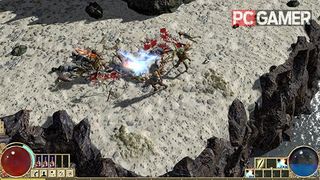
Yesterday, three New Zealanders came to our office with a dungeon-crawler. This doesn't usually happen. They let me play it. I liked it. Peer inside for impressions, screenshots and an exclusive classes and combat trailer that no one else on the internet has.
Our introduction to Grinding Gear Games' three-man envoy had a tinge of Flight of the Conchords humbleness to it--GGG is the second-largest game developer in New Zealand, but their development team totals just 16 (plus additional contractors). Path of Exile is the studio's first game; a labor since late 2006, originating from their raw appreciation of the genre.
“We've been playing dungeon crawlers for a long time. We've tried to take our favorite parts of action RPGs and improve upon them,” said Chris Wilson, founder of Grinding Gear. “We've designed the game that we would want to play ourselves, and we know hardcore Diablo, Titan Quest and Dungeon Siege players will find the style familiar and addictive,“ Wilson said.
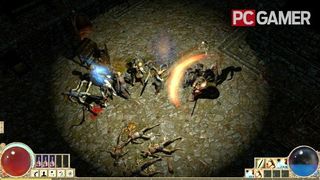
Some basics up front: Path of Exile will be completely free to play (all character classes, quests, chapters, abilities and items are available to everyone). The lads at Grinding Gear say they're committed to only charging for content that alters aesthetics--pretty armor, special particle effects like a dragon head-shaped fireball animation, or changing your character's name. That won't include any items or profile buffs that boost your rate of experience earning, which Grinding doesn't plan to put up for sale. “Some of the free-to-play games out there aren't actually free to play the way you want to--they're free to tolerate," said Wilson. "You can tell some of the games definitely want you pay money at regular intervals, and they'll punish you by having long grinds that you could be skipping--we just skip that entirely by not having the ability to buy those things. You can dress up your character if you'd like to. The other thing is that our game is made by western developers for a western market--hopefully that counts for something.”
There'll be six character classes, all of which (like existing dungeon crawlers) are independent damage-dealers--Exile won't include specialized support classes like a priest. The Marauder and Ranger are the two that've been revealed so far: the former is a tank-melee class (smartly, but hopefully not to the aid of griefers, character models can't pass through each other in Exile, meaning you can use a Marauder to block a doorway while a ranged character tosses projectiles from a safe distance), the latter approximates Diablo's Rogue.
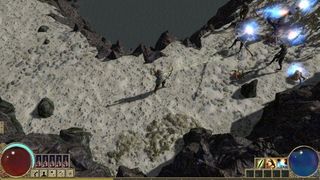
Exile's skill system is its stand-out addition. All active abilities are sourced from gems found from enemies or earned through quest-doing, and these orbs slot into your weapons and armor. Higher-level equipment will have more slots, letting you construct unique abilities. Reaching third level, my Marauder earned a fireball spell after the introductory battle (all characters begin the game washing ashore on a beach, clubbing or arrowing zombies and angry crabs up the coast until they reach a town hub). But following that, the developers loaded up two characters with higher-level ability gems. With a few hundred more clicks under their belt, these characters had gems that added multiple fireballs to our spell, allowed the fireballs (or our arrows) to pierce enemies, increased the chance that enemies would catch on fire, and increased the time that enemies would burn if they caught on fire. There's a gem that buffs the chance that that fire will spread, too.
The interesting part about this is that individual gems controlled each component of the spell: one gem amped the fire spread, another increased its ability to penetrate enemies. Assembling the actual mechanics of your spells and abilities in this way is damn appealing. Torchlight's socketing system also let us drop gems of varied power into our weapons, but mostly to boost the damage output.
PC Gamer Newsletter
Sign up to get the best content of the week, and great gaming deals, as picked by the editors.
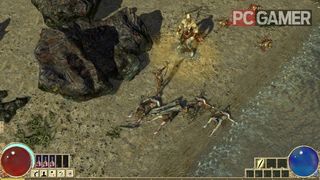
The trimmings we expect from an action-RPG will be present: Exile will have PvP, item trading, tiers of randomly-generated unique minibosses and randomly-generated indoor and outdoor terrain. Mainly I'm hoping that the game's next showing before it releases in early 2011 will reveal a more nuanced layer of "visceral combat," as Grinding Gear likes to refer to it; one ever-fresh, ever-amusing aspect of Titan Quest was the way angry centaurs would ragdoll and crumble to the ground after you bashed them (or better yet, off a cliff)--right now, Exile doesn't have that same feeling of pinballing enemies around the environment with your weapons.
Exile's stark art design is another source of joy and mild concern: I love the grim detail of the character models--my character wielded his first weapon (a long axe) more like a gardening tool than a military-made blade. That feeling of using non-pristine equipment could lend a sense of brutality to combat. I'm less confident in the way the aesthetic influenced level art: the sections we mashed through were floored with repetitive, murky floor textures. This may mean that it'll allow characters and ability effects to contrast that much more during combat, but I'm hoping Exile will work in at least one or two tonal shifts in level design. Remember the feeling of advancement you got when you transitioned from Diablo's early catacombs to its later, lava levels in hell. More of that, please.
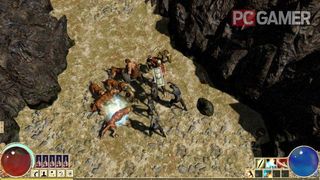
In Wilson's own words, the specific things that Grinding Gear feel sets Path of Exile apart from its upcoming competition are that the game is played entirely online on its servers ("because of that there's a proper economy where people's items are valuable," says Wilson) and that "the gameplay is quite dark--we've tried to get a lot of horror elements in there. When [our art director] was designing the world, he put a lot of effort into making it foreboding. It's not a cartoon game for children.”
Don't expect a playful dog to follow you around dungeons, then. Visit Path of Exile's website for an additional trailer and pre-registration for the beta by creating a forum account.

Evan's a hardcore FPS enthusiast who joined PC Gamer in 2008. After an era spent publishing reviews, news, and cover features, he now oversees editorial operations for PC Gamer worldwide, including setting policy, training, and editing stories written by the wider team. His most-played FPSes are CS:GO, Team Fortress 2, Team Fortress Classic, Rainbow Six Siege, and Arma 2. His first multiplayer FPS was Quake 2, played on serial LAN in his uncle's basement, the ideal conditions for instilling a lifelong fondness for fragging. Evan also leads production of the PC Gaming Show, the annual E3 showcase event dedicated to PC gaming.
Most Popular

